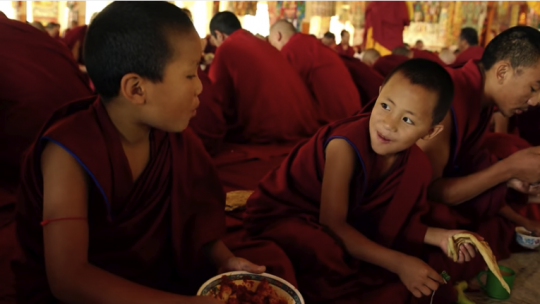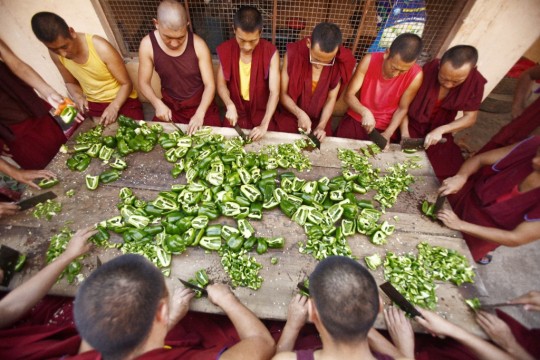- Home
- FPMT Homepage
Foundation for the Preservation of the Mahayana Tradition
The FPMT is an organization devoted to preserving and spreading Mahayana Buddhism worldwide by creating opportunities to listen, reflect, meditate, practice and actualize the unmistaken teachings of the Buddha and based on that experience spreading the Dharma to sentient beings. We provide integrated education through which people’s minds and hearts can be transformed into their highest potential for the benefit of others, inspired by an attitude of universal responsibility and service. We are committed to creating harmonious environments and helping all beings develop their full potential of infinite wisdom and compassion. Our organization is based on the Buddhist tradition of Lama Tsongkhapa of Tibet as taught to us by our founders Lama Thubten Yeshe and Lama Thubten Zopa Rinpoche.
- Willkommen
Die Stiftung zur Erhaltung der Mahayana Tradition (FPMT) ist eine Organisation, die sich weltweit für die Erhaltung und Verbreitung des Mahayana-Buddhismus einsetzt, indem sie Möglichkeiten schafft, den makellosen Lehren des Buddha zuzuhören, über sie zur reflektieren und zu meditieren und auf der Grundlage dieser Erfahrung das Dharma unter den Lebewesen zu verbreiten.
Wir bieten integrierte Schulungswege an, durch denen der Geist und das Herz der Menschen in ihr höchstes Potential verwandelt werden zum Wohl der anderen – inspiriert durch eine Haltung der universellen Verantwortung und dem Wunsch zu dienen. Wir haben uns verpflichtet, harmonische Umgebungen zu schaffen und allen Wesen zu helfen, ihr volles Potenzial unendlicher Weisheit und grenzenlosen Mitgefühls zu verwirklichen.
Unsere Organisation basiert auf der buddhistischen Tradition von Lama Tsongkhapa von Tibet, so wie sie uns von unseren Gründern Lama Thubten Yeshe und Lama Thubten Zopa Rinpoche gelehrt wird.
- Bienvenidos
La Fundación para la preservación de la tradición Mahayana (FPMT) es una organización que se dedica a preservar y difundir el budismo Mahayana en todo el mundo, creando oportunidades para escuchar, reflexionar, meditar, practicar y actualizar las enseñanzas inconfundibles de Buda y en base a esa experiencia difundir el Dharma a los seres.
Proporcionamos una educación integrada a través de la cual las mentes y los corazones de las personas se pueden transformar en su mayor potencial para el beneficio de los demás, inspirados por una actitud de responsabilidad y servicio universales. Estamos comprometidos a crear ambientes armoniosos y ayudar a todos los seres a desarrollar todo su potencial de infinita sabiduría y compasión.
Nuestra organización se basa en la tradición budista de Lama Tsongkhapa del Tíbet como nos lo enseñaron nuestros fundadores Lama Thubten Yeshe y Lama Zopa Rinpoche.
A continuación puede ver una lista de los centros y sus páginas web en su lengua preferida.
- Bienvenue
L’organisation de la FPMT a pour vocation la préservation et la diffusion du bouddhisme du mahayana dans le monde entier. Elle offre l’opportunité d’écouter, de réfléchir, de méditer, de pratiquer et de réaliser les enseignements excellents du Bouddha, pour ensuite transmettre le Dharma à tous les êtres. Nous proposons une formation intégrée grâce à laquelle le cœur et l’esprit de chacun peuvent accomplir leur potentiel le plus élevé pour le bien d’autrui, inspirés par le sens du service et une responsabilité universelle. Nous nous engageons à créer un environnement harmonieux et à aider tous les êtres à épanouir leur potentiel illimité de compassion et de sagesse. Notre organisation s’appuie sur la tradition guéloukpa de Lama Tsongkhapa du Tibet, telle qu’elle a été enseignée par nos fondateurs Lama Thoubtèn Yéshé et Lama Zopa Rinpoché.
Visitez le site de notre Editions Mahayana pour les traductions, conseils et nouvelles du Bureau international en français.
Voici une liste de centres et de leurs sites dans votre langue préférée
- Benvenuto
L’FPMT è un organizzazione il cui scopo è preservare e diffondere il Buddhismo Mahayana nel mondo, creando occasioni di ascolto, riflessione, meditazione e pratica dei perfetti insegnamenti del Buddha, al fine di attualizzare e diffondere il Dharma fra tutti gli esseri senzienti.
Offriamo un’educazione integrata, che può trasformare la mente e i cuori delle persone nel loro massimo potenziale, per il beneficio di tutti gli esseri, ispirati da un’attitudine di responsabilità universale e di servizio.
Il nostro obiettivo è quello di creare contesti armoniosi e aiutare tutti gli esseri a sviluppare in modo completo le proprie potenzialità di infinita saggezza e compassione.
La nostra organizzazione si basa sulla tradizione buddhista di Lama Tsongkhapa del Tibet, così come ci è stata insegnata dai nostri fondatori Lama Thubten Yeshe e Lama Zopa Rinpoche.
Di seguito potete trovare un elenco dei centri e dei loro siti nella lingua da voi prescelta.
- 欢迎 / 歡迎
简体中文
“护持大乘法脉基金会”( 英文简称:FPMT。全名:Foundation for the Preservation of the Mahayana Tradition) 是一个致力于护持和弘扬大乘佛法的国际佛教组织。我们提供听闻,思维,禅修,修行和实证佛陀无误教法的机会,以便让一切众生都能够享受佛法的指引和滋润。
我们全力创造和谐融洽的环境, 为人们提供解行并重的完整佛法教育,以便启发内在的环宇悲心及责任心,并开发内心所蕴藏的巨大潜能 — 无限的智慧与悲心 — 以便利益和服务一切有情。
FPMT的创办人是图腾耶喜喇嘛和喇嘛梭巴仁波切。我们所修习的是由两位上师所教导的,西藏喀巴大师的佛法传承。
繁體中文
護持大乘法脈基金會”( 英文簡稱:FPMT。全名:Found
ation for the Preservation of the Mahayana Tradition ) 是一個致力於護持和弘揚大乘佛法的國際佛教組織。我們提供聽聞, 思維,禪修,修行和實證佛陀無誤教法的機會,以便讓一切眾生都能 夠享受佛法的指引和滋潤。 我們全力創造和諧融洽的環境,
為人們提供解行並重的完整佛法教育,以便啟發內在的環宇悲心及責 任心,並開發內心所蘊藏的巨大潛能 — 無限的智慧與悲心 – – 以便利益和服務一切有情。 FPMT的創辦人是圖騰耶喜喇嘛和喇嘛梭巴仁波切。
我們所修習的是由兩位上師所教導的,西藏喀巴大師的佛法傳承。 察看道场信息:
- FPMT Homepage
- News/Media
-
- Study & Practice
-
-
- About FPMT Education Services
- Latest News
- Programs
- New to Buddhism?
- Buddhist Mind Science: Activating Your Potential
- Heart Advice for Death and Dying
- Discovering Buddhism
- Living in the Path
- Exploring Buddhism
- FPMT Basic Program
- FPMT Masters Program
- FPMT In-Depth Meditation Training
- Maitripa College
- Lotsawa Rinchen Zangpo Translator Program
- Universal Education for Compassion & Wisdom
- Online Learning Center
-
- Prayers & Practice Materials
- Overview of Prayers & Practices
- Full Catalogue of Prayers & Practice Materials
- Explore Popular Topics
- Benefiting Animals
- Chenrezig Resources
- Death & Dying Resources
- Lama Chopa (Guru Puja)
- Lama Zopa Rinpoche: Compendium of Precious Instructions
- Lama Zopa Rinpoche: Life Practice Advice
- Lama Zopa Rinpoche Practice Series
- Lamrim Resources
- Mantras
- Prayer Book Updates
- Purification Practices
- Sutras
- Thought Transformation (Lojong)
- Audio Materials
- Dharma Dates - Tibetan Calendar
- Translation Services
- Publishing Services
- Ways to Offer Support
- Prayers & Practice Materials
-
- Teachings and Advice
- Find Teachings and Advice
- Lama Zopa Rinpoche Advice Page
- Lama Zopa Rinpoche: Compendium of Precious Instructions
- Lama Zopa Rinpoche Video Teachings
- ༧སྐྱབས་རྗེ་བཟོད་པ་རིན་པོ་ཆེ་མཆོག་ནས་སྩལ་བའི་བཀའ་སློབ་བརྙན་འཕྲིན།
- Podcasts
- Lama Yeshe Wisdom Archive
- Buddhism FAQ
- Dharma for Young People
- Resources on Holy Objects
- Teachings and Advice
-
-
*If a menu item has a submenu clicking once will expand the menu clicking twice will open the page.
-
-
- Centers
-
- Teachers
-
- Projects
-
-
-
-
*If a menu item has a submenu clicking once will expand the menu clicking twice will open the page.
-
-
- FPMT
-
-
-
-
-
Practice with the bodhisattva attitude every day. People can’t see your mind; what people see is a manifestation of your attitude in your actions of body and speech. So pay attention to your attitude all the time. Guard it as if you are the police, or like a parent cares for a child, like a bodyguard, or as if you are the guru and your mind is your disciple.
Lama Zopa Rinpoche
-
-
-
- Shop
-
-
-
The Foundation Store is FPMT’s online shop and features a vast selection of Buddhist study and practice materials written or recommended by our lineage gurus. These items include homestudy programs, prayers and practices in PDF or eBook format, materials for children, and other resources to support practitioners.
Items displayed in the shop are made available for Dharma practice and educational purposes, and never for the purpose of profiting from their sale. Please read FPMT Foundation Store Policy Regarding Dharma Items for more information.
-
-
Sera Je Food Fund News
26
An Update and Incredible Achievement from the Sera Je Food Fund
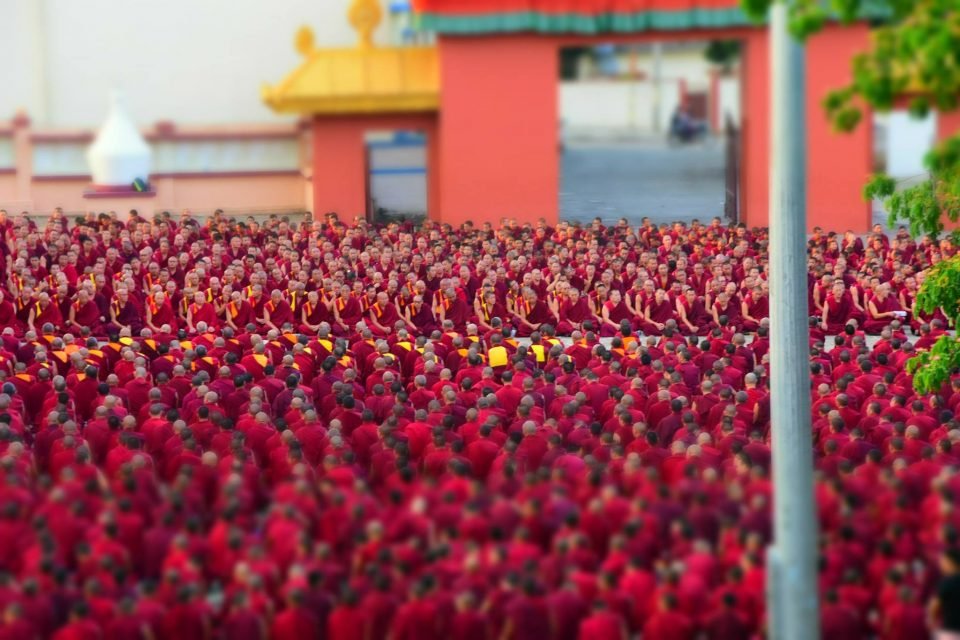
Monks of Sera Je Monastery. Photo courtesy of the Sera Je Monastery Facebook page.
In 2017, after twenty-six years of the Sera Je Food Fund offering daily meals to all of the 2,500 monks of Sera Je Monastery, FPMT Charitable Projects raised and then offered a US$5.3 million endowment fund to Sera Je Monastery. The interest generated annually from this endowment supports the entire Sera Je Food Fund expenses.
Sera Je Monastery manages and is entirely responsible for the endowment, but as part of the agreement, FPMT International Office does continue to monitor it. We are very pleased to report that this endowment is continuing to generate enough interest to cover all the costs (which have increased since 2017, as was expected) of the Sera Je Food Fund so this most precious daily offering continues uninterrupted. In addition there is a little extra income generated from the interest and that is reinvested to continue to grow the endowment.
When this project first started in 1991, Lama Zopa Rinpoche and Ven. Roger Kunsang were the main fundraisers for so many years. Then slowly FPMT Charitable Projects took on the entire responsibility so Rinpoche didn’t have to personally raise the funds. In addition, a few centers were key in helping with fundraising and tens of thousands of supporters over the years have also been inspired to donate.
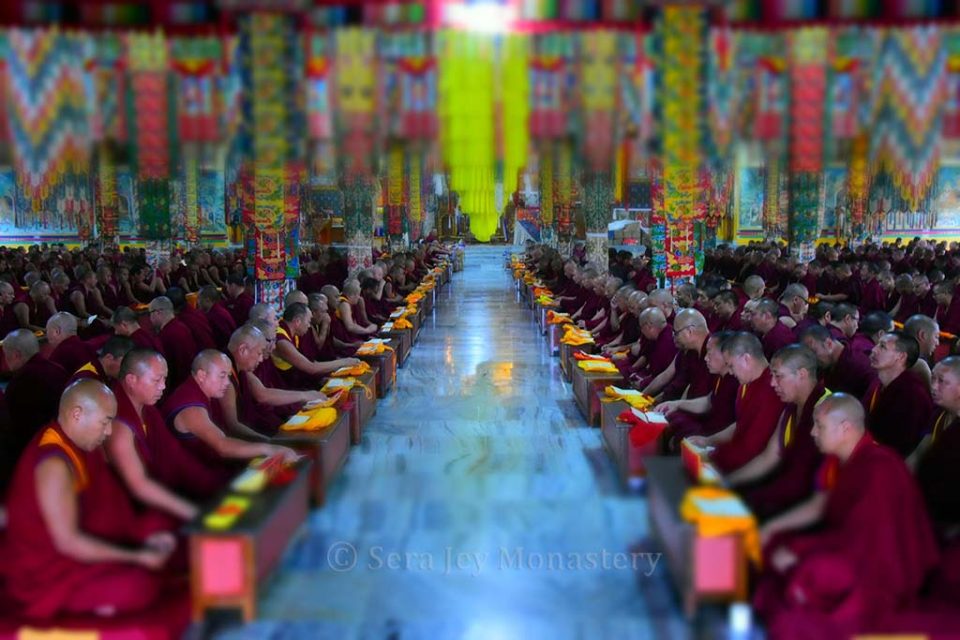
Monks of Sera Je Monastery engaged in puja. Photo courtesy of Sera Je Monastery.
When the food fund first began, we were only able to offer a small amount of money to each monk for their midday meal. Then we started to provide a cooked meal that was served to every monk. Later we added dinner, and then breakfast. We built a kitchen and catered to the thousands of monks every day with special attention given to maintaining a hygienic environment for meal preparation, and a balanced offering of nutritious food. And now, due to the endowment that was built up over ten years, this project is now totally self-sufficient. How amazing!
Thank you so much to everyone who helped to create this incredible offering that brings so much benefit to all the monks of Sera Je Monastery who in turn are working so hard to benefit the entire world through Buddha’s teachings. Supporting monks and nuns has always been one of the highest priorities for Lama Zopa Rinpoche and the FPMT organization because the preservation of the Dharma is dependent on the existence of Sangha.
Please learn more about the Supporting Ordained Sangha Fund and the ways it supports monasteries and nunneries around the world.
You can read the complete article on the food fund, “Sustaining the Pure Unbroken Lineage of Buddha’s Teachings in This World: The Legacy of the Sera Je Food Fund,” in Mandala eZine format and as a PDF.
- Tagged: sera je, sera je food fund, sera je monastery
31

Jangtse Chöje Rinpoche and Lama Zopa Rinpoche during the long life puja offered to Lama Zopa Rinpoche in Bodhgaya on January 2, 2017. Photo by Ven. Lobsang Sherab.
A long life puja was offered to Lama Zopa Rinpoche on behalf of Sera Je Monastery on the Maitreya Project land in Bodhgaya on January 2, 2017. The puja was to thank Rinpoche for twenty-six years of support offered through the Sera Je Food Fund, which provides three vegetarian meals every day to the monks studying at Sera Je Monastery.
During the puja, the head of monastic discipline, who had been at Sera Je Monastery since before the Sera Je Food Fund was established, spontaneously praised Rinpoche for about thirty minutes, noting all the ways Rinpoche had helped the monastery. He explained what it was like at the monastery before food was regularly offered and how the monks have benefited after the fund’s creation. He said Rinpoche has cared for all the thousands of monks for the last twenty-six years like a mother does for her child.
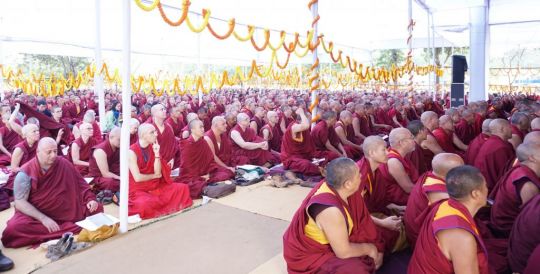
Sangha participating in the long life puja offered to Lama Zopa Rinpoche
Thousands of monks attended the puja as well as Jangtse Chöje; the new abbot of Sera Je Monastery; the past abbot of Sera Je Monastery; the past abbot of Namgyal Monastery, Jhado Rinpoche; and the past abbot of Gyurme Monastery, Khensur Geshe Tashi Tsering.
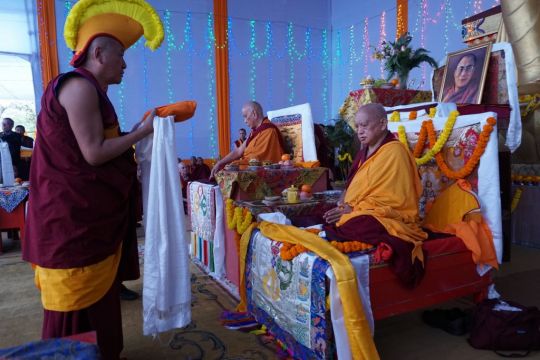
The abbot of Sera Je Monastery making offerings to Lama Zopa Rinpoche
The Sera Je Food Fund has provided millions of meals since 1991. It currently offers approximately 700,000 meals per year, 2,900 meals per day. There are, on average, 1,600 monks benefiting from the food fund.
Please rejoice in the offering of this puja for Lama Zopa Rinpoche’s long life and in Sera Je Food Fund’s twenty-six years of food offerings to the monks of Sera Je Monastery.
You can learn more about the Sera Je Food Fund, read an overview of the food offered daily, or support this project with a donation of any amount.
- Tagged: long life puja, sera je food fund, sera je monastery
- 0
27
Another Year of Offering Food to the Monks of Sera Je Monastery
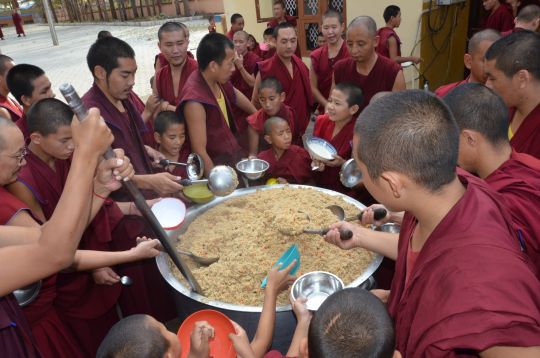
Approximately 1,600 monks benefit from the Sere Je Food Fund every year.
As 2016 comes to a close, we’d like to invite you to rejoice in another year of offering food to all of the monks studying at Sera Je Monastery through the Sera Je Food Fund.
Since 1991 the Sera Je Food Fund has offered millions of meals. We currently offer approximately 700,000 meals per year, 2,900 meals per day.
You can watch a short video about the Sera Je Food Fund as an overview of this incredible project:
www.youtube.com/watch?v=copRgB9eaSo
In the Tibetan tradition, it is customary for monastics to support themselves. In addition to providing for their own housing, individual monks are responsible for purchasing and preparing all of their meals. As many of the monks are refugees from Tibet or from refugee families living in India, they have very little money for quality food and, consequently, were often malnourished and ill. Before the Sera Je Food Fund, most monks at the monastery never had adequate nutrition. Now, for the first time, they are well-nourished, and this makes a dramatic difference in the energy they are able to devote to their studies. Additionally, group preparation of meals and use of a communal kitchen allows more time for the monks to apply themselves to their studies without the added worry of cleaning up and preparing individual meals, monitoring their individual health for adequate protein and nutrition, etc.
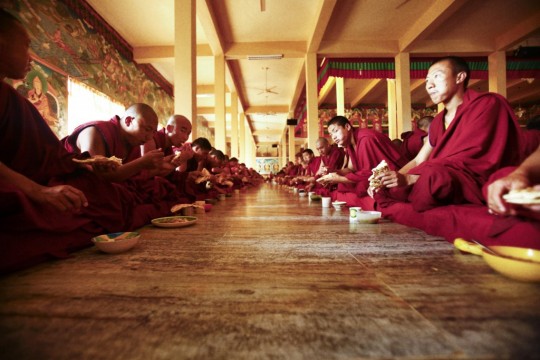
Monks of Sera Je Monastery enjoying a meal provided by the Sera Je Food Fund. Photo by Losan Piatti.
Please rejoice in this incredible service which has been offered since 1991.
On behalf of Lama Zopa Rinpoche, FPMT International Office would like to offer our heartfelt gratitude to all of the kind benefactors who have been contributing to this project over the years and supporting Lama Zopa Rinpoche’s Vast Vision.
You can learn more about the Sera Je Food Fund or support this project with a donation of any amount.
30
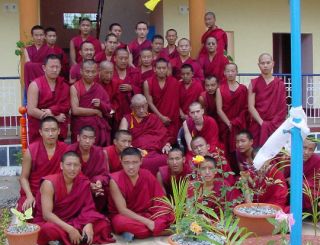
Teenage Tenzin Ösel Hita with the monks at Sera Je Monastery.
We’d like to invite you to rejoice in twenty-five years of the Sera Je Food Fund offerings meals to the monks of Sera Je Monstery!
The Sera Je Food Fund began in 1991 when Tenzin Ösel Hita, the recognized incarnation of Lama Yeshe, entered Sera Je Monastery in southern India at age six. It is customary for a monk’s sponsor to make offerings to all Sangha on the day of officially entering the monastery and Lama Zopa Rinpoche wanted the offering to be of the greatest practical benefit to the monastery itself. After discussion with the abbot of Sera Je Monastery, it was determined that the most beneficial offering would be to create a food fund whereby all of the monks at Sera Je Monastery could be offered quality meals for free. In this way, Lama Zopa Rinpoche was not simply offering lunch on the day of Ösel’s entrance to the monastery but, without precedent, taking on the responsibility of providing meals to every monk at Sera Je for the rest of their lives.
Initially, the fund offered money to each monk for lunch. At that time there were 1,300 monks and the annual cost was about US$25,000.
It became apparent that it would be much easier for the monks to have the meals cooked and offered, so in 1997, Lama Zopa Rinpoche offered US$25,000 for a new kitchen and began paying the salary of seven fulltime cooks. At that time there were 1,900 monks and the annual cost was about US$175,000.
In 1997, six years after starting the fund, Lama Zopa Rinpoche visited Sera Je Monastery. At that time, many of the older geshes, some with tears in their eyes, thanked Rinpoche and spoke of how the fund was benefiting the monastery. Monks could now attend all the morning debate sessions instead of taking time out to prepare meals. Additionally, the fund alleviated the great burden teachers carried while providing for students who had no resources.
In 1998, Lama Zopa Rinpoche and the Sera Je Food Fund took on the responsibility of offering dinner to each monk.
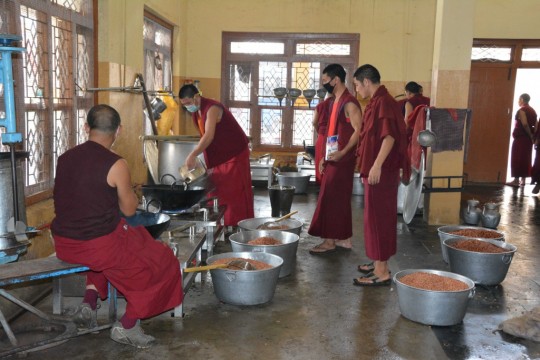
Sera Je monks help prepare meals for in the Sera Je Food Fund kitchen.
In 2003, in addition to offering lunch and dinner, breakfast began to be sponsored by the Sera Je Food Fund three months a year.
In 2008, Lama Zopa Rinpoche and the Sera Je Food Fund took on the responsibility to offer three meals a day to all monks of Sera Je. Osel Labrang took over management on the ground, ensuring the quality of the food and managing all aspects of buying and preparing the food.
In 2012, In addition to offering all the meals to all the monks at Sera Je Monastery the Sera Je Food Fund also took on the responsibility to offer breakfast to the young monks who attend the Sera Je school. This has been the practice of the fund since 2012.
Since 1991 the Sera Je Food Fund has offered millions of meals. We currently offer approximately 700,000 meals per year, 2,900 meals per day.
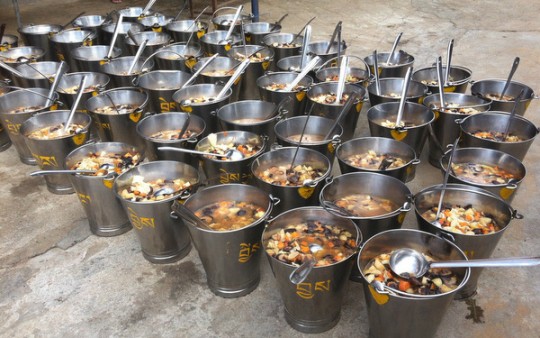
Healthy and hearty vegetarian soup is often offered, through the Sera Je Food Fund, as dinner to the monks of Sera Je Monastery.
There are, on average, 1,600 monks benefiting from the food fund and the annual cost is US$200,000.
In the Tibetan tradition, it is customary for monastics to support themselves. In addition to providing for their own housing, individual monks are responsible for purchasing and preparing all of their meals. As many of the monks are refugees from Tibet or from refugee families living in India, they have very little money for quality food and, consequently, were often malnourished and ill. Before the Sera Je Food Fund, most monks at the monastery never had a full stomach. Now, for the first time, they are well-nourished, and this makes a dramatic difference in the energy they are able to devote to their studies. Additionally, group preparation of meals and use of a communal kitchen allows more time for the monks to apply themselves to their studies without the added worry of cleaning up and preparing individual meals, monitoring their individual health for adequate protein and nutrition, etc.
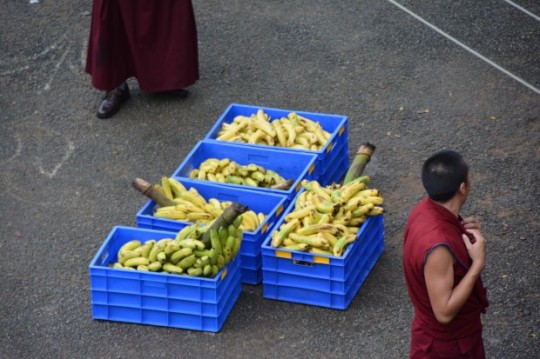
Over 22,000 bananas are offered in a typical month to the monks of Sera Je Food Fund.
In one month, nearly 22,000 bananas, 120 bottles of soy sauce, and an incredible 5,500 pounds of flour, among many other ingredients including vegetables, rice, noodles, and tea, are utilized in preparation for this offering of daily vegetarian meals.
Please rejoice in this incredible service which has been offered without interruption for twenty-five years and will continue far into the future. All are welcome to participate in this offering by donating to the fund.
On behalf of Lama Zopa Rinpoche, FPMT International Office would like to offer our heartfelt gratitude to all of the kind benefactors who have been contributing to this project over the years and supporting Lama Zopa Rinpoche’s Vast Vision.
You can learn more about the Sera Je Food Fund or support this project with a donation of any amount.
- Tagged: offering food, offering to sangha, sangha, sera je food fund, sera je monstery, supporting ordained sangha fund
- 0
12
Since 1991, the Sera Je Food Fund has been offering three meals a day to every monk studying at Sera Je Monastery. Some monks do not need to rely on this service due to various reasons such as having personal benefactors who sponsor their food directly, but the food offering is available to every single monk who would like to receive it.
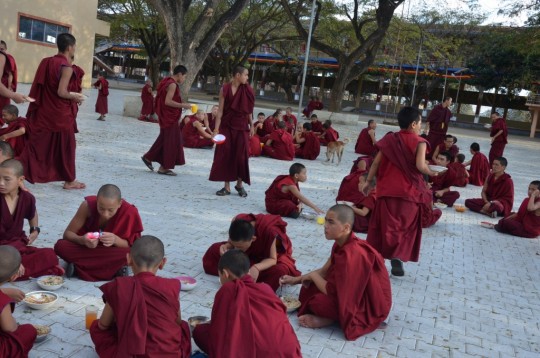
Three meals are offered every day to any monk studying at Sera Je Monastery.
Recently, Lama Zopa Rinpoche, FPMT CEO Ven. Roger Kunsang, and Charitable Projects Coordinator Ven. Holly Ansett spent a month at Sera Je Monastery with the Sera Je Food Fund team and attended a number of meetings with Ven. Ngawang Sangye who has been working for the food fund since 2007 while completing his geshe studies degree in 2016. He does an incredible job helping to manage this massive operation with the help of Vens Kalden and Rabten. They work with FPMT International Office on budget and cost analysis, which can become quite complicated when shopping and cooking for up to 2,500.
In these recent meeting, the team discussed improvements that could be made to the program, advice and recommendations from a dietitian who was consulted last year, how to utilize seasonal produce, and the general food preferences of the monks. Recently, the entire menu was redesigned based on feedback from the monks and discussion with the kitchen management. The food fund will continually assess and make adjustments and improvements to operations, procedures, and services offered to help ensure that this project is bringing the most benefit to those it serves.The Sera Je Food Fund not only covers the cost of all food, it is also responsible for the entire kitchen operation, paying cooks, utilities, and equipment upkeep.
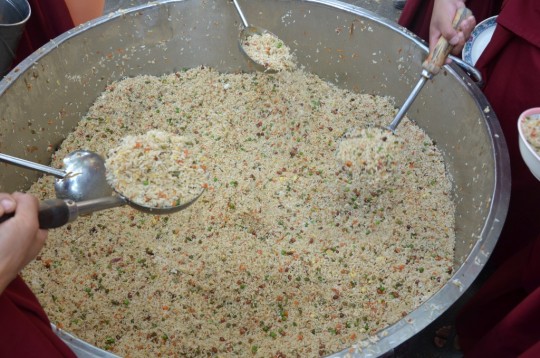
8,700 pounds of flour and 6,500 pounds of rice are offered every month through the Sera Je Food Fund Kitchen.
Every day each khangtsen (monastic house made up of monks from the same regions) informs the Sera Je Food Fund Kitchen how many monks will be joining for meals so the cooks can always prepare the right amount of food. There is almost no waste from the kitchen because any leftovers are offered to monks who engage in evening debate or classes allowing the monks to enjoy a second dinner if they are studying or debating late. Any food bought by the kitchen that is not used is sold back to the market making the waste for the kitchen extremely low. This is quite impressive when considering the volume of food being prepared and cooked. An incredible 8,700 pounds of flour and 6,500 pounds of rice are used every month in addition to large quantities of other foods such as vegetables, fruits, spices, grains, tea, milk, and other ingredients.
Typically, about 50 monks are assigned to kitchen duties every day. They help ensure that the ingredients are top quality, that the kitchen is always hygienic and efficient, and that the food is tasty for the monks. Lunch is often eaten as a group in the Sera Je gompa when there are pujas or practices happening.
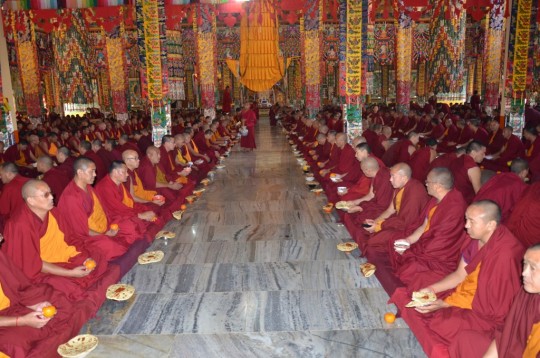
The monks gather in the gompa for lunch when there are prayers and pujas organized around lunch time.
Twenty-five years ago Lama Zopa Rinpoche initiated the Sera Je Food Fund as a way to offer daily benefit to all of the monks studying at Sera Je, enabling them to focus on their studies without having to worry about meals or the burden of food expenses and preparation. Since that time Ven. Roger has worked with support from Ven. Holly to help actualize this vision through continual work with the monastery and the benefactors who make this fund possible.
Please take some time to rejoice in this incredible daily offering and the kindness of all the extremely generous donors who contribute to the success of this program. From the prep cooks, to the dishwashers, to those who do the shopping, to those who help manage the operation, to the accountants, to the food vendors, the Sera Je Food Fund is a massive collective effort on the part of many.
You are welcome to join in on this offering by donating any amount, or by following the news and updates of this beneficial daily offering of food to hundreds of monks.
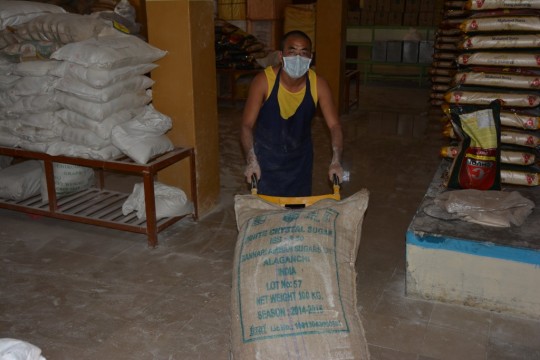
A monk from the Sera Je Food Fund Kitchen helps with flour needed for bread for 30,000.
Over 30,000 people, including monks from surrounding monasteries, packed into Tashi Lhunpo Monastery for the last of His Holiness the Dalai Lama’s Jangchup Lamrim teachings in South India in late December 2015.
The Sera Je Food Fund Kitchen prepared rice and bread to accompany the lunch offered by the teaching event, for every single participant. To accomplish this astounding offering, 150 monks woke up at 2 a.m. at Sera Je Monastry every morning to begin cooking. They then had to transport all of the bread and rice for 5.5 miles to Tashi Lhunpo Monastery in a sanitary way, every single day. Remarkably, they managed to serve the bread and rice steaming hot at lunch time. It is almost inconceivable to consider how they did this!
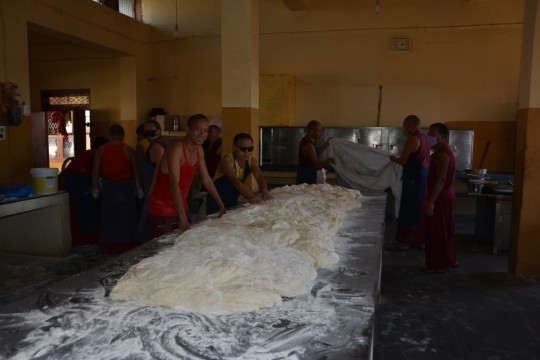
Volunteer monks help kneed the dough required for massive amounts of bread.
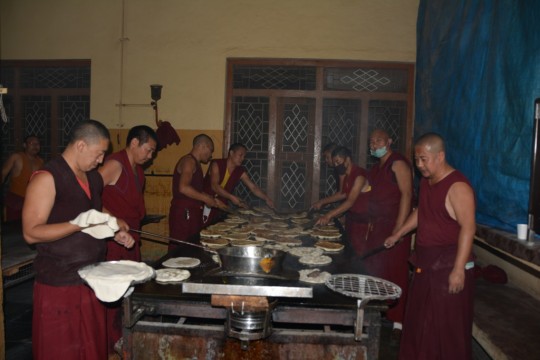
All of the bread had to be cooked on the grill before transporting it to Tashi Lhunpo Monastery.
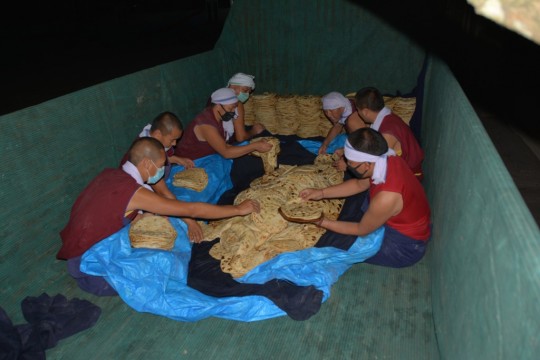
Bread for 30,000 getting carefully packed for transport to Tashi Lhunpo Monastery.
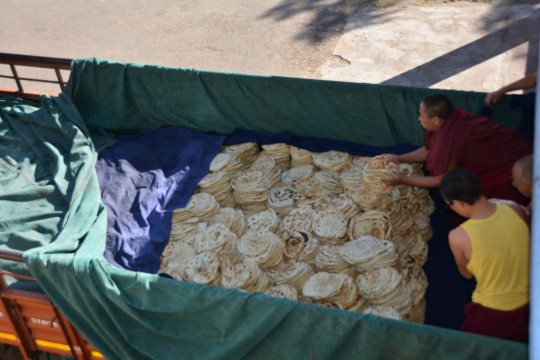
The bread is carefully packed and ready to be transported.
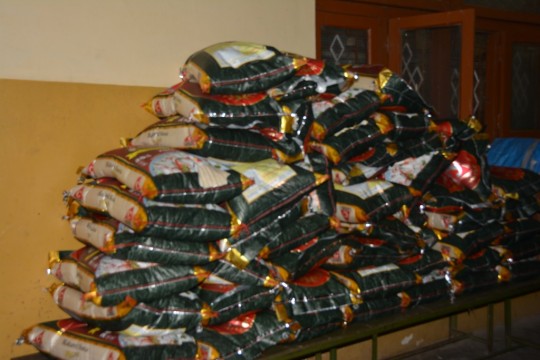
Rice for 30,000!
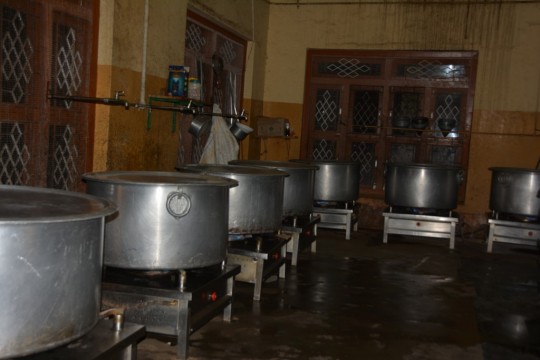
Giant pots were needed to prepare so much rice.
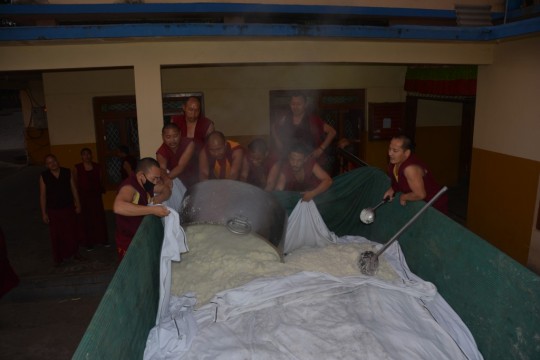
The rice is carefully loaded into a truck for transport.
This is just one way the Sera Je Food Fund Kitchen is utilized as a way to benefit ordained Sangha and students of His Holiness the Dalai Lama.
Huge thanks to all of the monks who volunteer their time to make this possible, and to Ngawang Sangye and the Sera Je Food Fund team who made this offering of time and effort so joyfully, as evidenced by the photos above. Please rejoice in this tremendous effort!
You can learn more about the Sera Je Food Fund: fpmt.org/projects/fpmt/seraje
12
Ongoing Efforts to Improve the Sera Je Food Fund’s Operations

Healthy and hearty vegetarian soup is often offered, through the Sera Je Food Fund, as dinner to the monks of Sera Je Monastery.
Since its inception in 1991, the Sera Je Food Fund has strived to assess and make adjustments and improvements to operations, procedures, and services offered to help ensure that this project is bringing the most benefit to those it serves. In 2015, two major changes were implemented which will not only benefit the monks as they partake in their daily meals, but also will benefit those who work very hard in the kitchen to get three vegetarian meals out every single day to all of the 2,500 monks.
in March of 2015 a dietitian visited the monastery and gave suggestions on how to improve the monks’ nutrition through the food offered. Changes include: an increase in protein, an increase in the amount and variety of vegetables and seasonal fruit, less oil and salt, wheat has been introduced to the white flour used in breads (most prefer the white flour so this is a gradual transition), more variety of healthful dishes are now being offered as well. The dietician also spoke to all the monks regarding healthy food and diet.
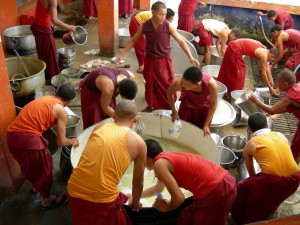
The monks have to work very hard with big equipment and huge quantities of food to help offer three meals every day.
In October of 2015 a wage increase has also been granted to the Sera Je kitchen staff. The kitchen staff work incredibly hard for the Sera Je Food Fund; monks can be expected to work from 4 a.m. to 9 p.m. on a rotating basis. This increase in salary will help increase staff morale with the hope that this will encourage experienced kitchen staff to stay in these jobs for longer periods of time. Having experienced staff is key to maintaining the standard of food served by the kitchen.
Please rejoice in the ongoing improvements to the operations of the Sera Je Food Fund which, for twenty-five years, has been offering meals to the monks studying at Sera Je Monastery.
You can learn more about the Sera Je Food Fund: fpmt.org/projects/fpmt/seraje
- Tagged: sera je food fund
- 0
15
52,254 Pounds of Flour Used Every Six Months by the Sera Je Food Fund

Monks of Sera Je Monastery enjoying a meal provided by the Sera Je Food Fund. Photo by Losan Piatti.
Every day, an incredible effort from many individuals, and a large quantity of food and supplies is needed to prepare, cook, and serve three meals per day to all of the monks studying at Sera Je Food Fund. Over the six months, the Sera Je Food Fund has used 52,254 pounds of flour, 39,062 pounds of rice, and large quantities of other foods such as vegetables, fruits, spices, grains, tea, milk, and other ingredients.
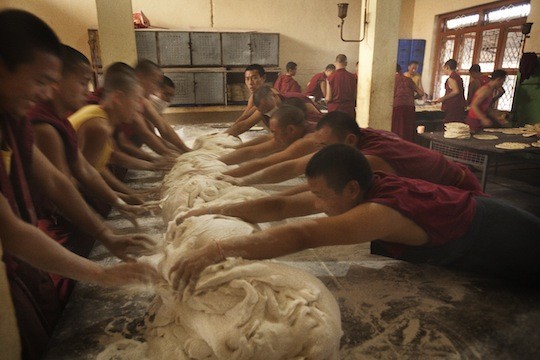
Many volunteers offer their time to make sure the meals are prepared, cooked and served three times per day.
The cost for offering food through the Sera Je Food Fund, including all the operating costs, supplies, maintenance, and utilities is US$280,000 a year. In six months, US$90,908.09 was spent on food alone.
Recently, a short film on the Sera Je Food Fund featuring Lama Zopa Rinpoche was released. In this video Rinpoche candidly speaks on the importance of supporting the food fund and the role it plays in spreading the Dharma in our world. Scenes from daily life at the monastery, including the logistics of preparing meals for all 2,500 resident monks at a time.
The Sera Je Food Fund is approaching its 25th year, and the support it’s received and the impact the fund has on the quality of life at Sera Je monastery deserves rejoicing and tremendous thanks for all involved.
You can sponsor meals for the monks of Sera Je Monastery as well as keep up on news and updates for this project.
- Tagged: sera je food fund
- 0
1
New Short Film on the Sera Food Fund Featuring Lama Zopa Rinpoche Just Released
A beautiful new short film on the Sera Je Food Fund featuring Lama Zopa Rinpoche was released last week. In it Rinpoche candidly speaks on the importance of supporting the food fund and the role it plays in spreading the Dharma in our world. Scenes from daily life at the vibrant monastery, including what it takes to prepare meals for all 2,500 resident monks at a time, weave through the interview with Rinpoche.
The Sera Je Food Fund is approaching its 25th year, and the support it’s received and the impact the fund has on the quality of life at Sera Je monastery deserves endless rejoicing and thanks for all involved.
Sera Je Monastery, located in southern India, is the largest Tibetan monastic university, and therefore is vital to the preservation of the tradition. As Lama Zopa Rinpoche points out in the film, “If this monastery goes down, the education and teaching goes down, if there’s no food, the means of living goes down, then we cannot have teachers around the world, and the opportunity for many sentient beings to achieve higher rebirth… and ultimate happiness.”
Before the food fund was created, the monastery was struggling to provide nourishment for all of the monks. Now with everyone’s support, the food fund offers every single monk three healthy vegetarian meals a day, everyday, totaling over 3 million meals per year.
Please take a moment to rejoice in all the generosity and hard work of all who have supported the Sera Je Food Fund over nearly 25 years, and how it’s helping Sera Monastery cultivate our future teachers and preserve the Buddhadharma.
If you would like to get involved and offer meals so the monks can excel in their studies, visit the Sera Je Food Fund’s homepage today.
Many thanks go out also to Matteo Passigato who so kindly filmed and edited the video, and to Lara Gatto for all her kind help.
13
Sera Je Food Fund Offered Sponsorship for Another Year
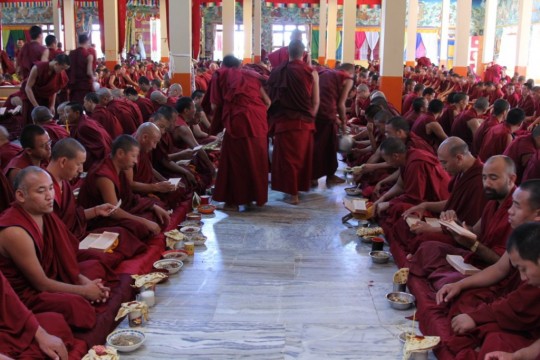
Through the Sera Je Food Fund, 8,300 meals are offered every day to the monks of Sera Je Monastery.
The Sera Je Food Fund offers three meals, daily, to all of the monks studying at Sera Je Monastery. Over three million meals are offered every year, a massive and collective effort of many volunteers at the monastery (who shop for, prepare, and clean up after each meal) as well as many kind donors who contribute to this fund. Lama Zopa Rinpoche started this project in 1991 and has committed to making this offering every day, every year, for as long as possible. Please rejoice that another year of food for this project has been successfully sponsored. Funds offered, together with local interest earned, is used to sponsor food for the entire year.
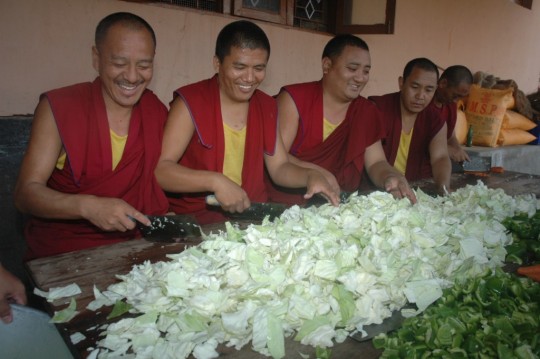
Many volunteers at the monastery shop for food, prepare meals, and clean up after each meal. This is a huge collective effort which must happen every single day.
Why a Food Fund?
In the Tibetan tradition, it is customary for monastics to support themselves. In addition to providing for their own housing, individual monks are responsible for purchasing and preparing all of their meals. As many of the monks are refugees from Tibet or from refugee families living in India, they have very little money for quality food and, consequently, were often malnourished and ill. Before the Sera Je Food Fund, most monks at the monastery never had a full stomach. Now, for the first time, they are well-nourished, and this makes a dramatic difference in the energy they are able to devote to their studies. Additionally, group preparation of meals and use of a communal kitchen allows more time for the monks to apply themselves to their studies without the added worry of cleaning up and preparing individual meals, monitoring their individual health for adequate protein and nutrition, etc.
Please read about the benefits of the Sera Je Food Fund and the benefits of making offerings to the Sangha by Lama Zopa Rinpoche.
You can learn more about the Sera Je Food Fund, read an overview of the food offered daily, or support this project with a donation of any amount.
2
Sera Je Food Fund Distributes Food to Monks Over Summer Break
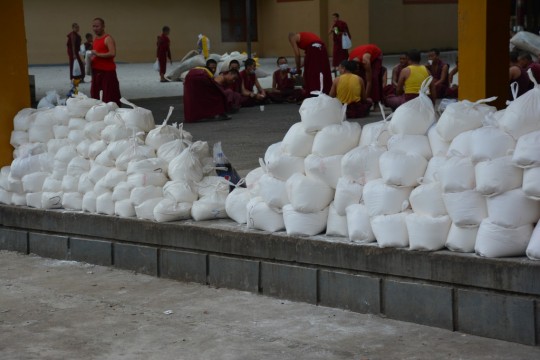
Cooking and food staples, such as flour, were offered to 2,973 monks at Sera Je Monastery over the Summer break.
The Sera Je Food Fund is responsible for offering three nutritious meals to all the monks studying at Sera Je Monastery. As the monastery closes for the Summer (and thus, the kitchen closes), the fund makes other arrangements so the monks at the monastery have meals while the monastery is on break.
Basic dry food staples are distributed to 2,973 monks ensuring they are able to provide meals for themselves until the monastery and kitchen are back in full operation.
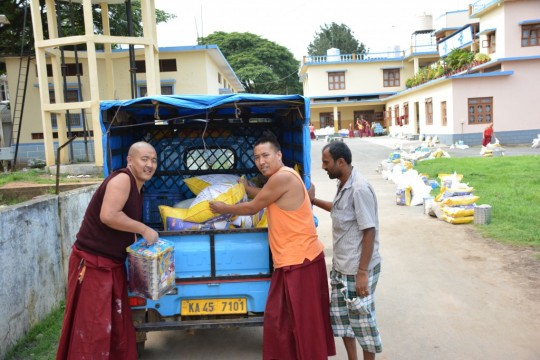
Without support from the Sera Je Food Fund, the monks of Sera Je Monastery would have to struggle to adequately feed themselves when the monastery closes for Summer break.
In 2011, Lama Zopa Rinpoche said the following, “Regarding the Sera Je Food Fund, this is making offerings to Sangha … wow … wow! Can you imagine the merit of that? Even making small charity the size of a single strand of hair? Can you imagine? In the monastery there are Sangha living in the five vows, but the majority of the Sangha are living in higher vows such as getsül (36 vows) and gelong, a fully ordained bhikkshu (253 vows). Most of the Sangha are gelongs and living in highest number of vows … wow … wow … wow! One creates so much merit by making offerings to Sangha due to the power of the object.” You can read Rinpoche’s complete advice, “Benefits of the Sera Je Food Fund.”
All of this is possible due to the kindness of many donors contributing in large and small ways. If you would like to get involved, to help ensure that the monks of Sera Je Monastery are offered food long into the future, you are welcome to contribute any amount to the Sera Je Food Fund.
You can sponsor meals for the monks of Sera Je Monastery as well as keep up on news and updates for this project.
- Tagged: sera je food fund, sera je monastery
- 0
11
8,300 Meals Offered Every Day to Monks of Sera Je Monastery
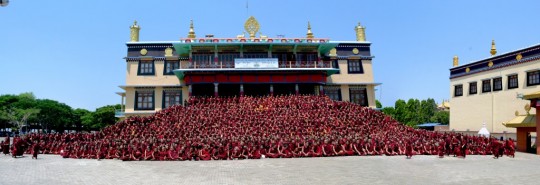
The monks of Sera Je Monastery are offered three nutritious meals every single day through the Sera Je Food Fund.
Since 1991, the Sera Je Food Fund has offered meals to the monks studying at Sera Je Monastery in southern India. Today, the fund sponsors 8,300 meals every single day for all 2,500 Sera Je Monastery monks (3,300 monks are served breakfast). This offering allows the monks to concentrate on their studies without the constant worry of sourcing and preparing their next meal.
This hour-long video shows the Sera Je Monks practicing in retreat and offering puja, engaging with the local community, and toward the end (45 mins 22 seconds) we see a behind-the-scenes look at the food fund’s operation in action.
In a recent letter from Sera Je Monastery, the abbot expressed, “The monastery is indebted to offer our devout prayers and ritual ceremonies in dedication of sponsors and supporters of Sera Je Food Fund program, its founder the ever compassionate Lama Zopa Rinpoche, and his esteemed FPMT.”
Please enjoy this short video of the monks sharing one of these meals together.
This most precious offering of food is made possible due to the kindness of many donors and benefactors. Tremendous thanks to all who have contributed to the fund. Donations of all sizes make a difference and allow the following to be provided:
- US$10: three vegetarian meals a day to one monk for one month
- US$120: three vegetarian meals a day to one monk for one year
- US$780: three vegetarian meals a day to all 2,500 monks for one day
- US$5,460: three vegetarian meals a day to all 2,500 monks for one week
- US$280,000: three vegetarian meals a day to all the 2,500 monks for one year
You can learn more about the Sera Je Food Fund:
https://fpmt.org/projects/fpmt/seraje
Explore FPMT’s many charitable projects and social service activities:
https://fpmt.org/projects/fpmt/
- Tagged: sera je food fund, sera je monastery
- 0
- Home
- News/Media
- Study & Practice
- About FPMT Education Services
- Latest News
- Programs
- New to Buddhism?
- Buddhist Mind Science: Activating Your Potential
- Heart Advice for Death and Dying
- Discovering Buddhism
- Living in the Path
- Exploring Buddhism
- FPMT Basic Program
- FPMT Masters Program
- FPMT In-Depth Meditation Training
- Maitripa College
- Lotsawa Rinchen Zangpo Translator Program
- Universal Education for Compassion & Wisdom
- Online Learning Center
- Prayers & Practice Materials
- Overview of Prayers & Practices
- Full Catalogue of Prayers & Practice Materials
- Explore Popular Topics
- Benefiting Animals
- Chenrezig Resources
- Death & Dying Resources
- Lama Chopa (Guru Puja)
- Lama Zopa Rinpoche: Compendium of Precious Instructions
- Lama Zopa Rinpoche: Life Practice Advice
- Lama Zopa Rinpoche Practice Series
- Lamrim Resources
- Mantras
- Prayer Book Updates
- Purification Practices
- Sutras
- Thought Transformation (Lojong)
- Audio Materials
- Dharma Dates – Tibetan Calendar
- Translation Services
- Publishing Services
- Teachings and Advice
- Find Teachings and Advice
- Lama Zopa Rinpoche Advice Page
- Lama Zopa Rinpoche: Compendium of Precious Instructions
- Lama Zopa Rinpoche Video Teachings
- ༧སྐྱབས་རྗེ་བཟོད་པ་རིན་པོ་ཆེ་མཆོག་ནས་སྩལ་བའི་བཀའ་སློབ་བརྙན་འཕྲིན།
- Podcasts
- Lama Yeshe Wisdom Archive
- Buddhism FAQ
- Dharma for Young People
- Resources on Holy Objects
- Ways to Offer Support
- Centers
- Teachers
- Projects
- Charitable Projects
- Make a Donation
- Applying for Grants
- News about Projects
- Other Projects within FPMT
- Support International Office
- Projects Photo Galleries
- Give Where Most Needed
- FPMT
- Shop
Translate*
*powered by Google TranslateTranslation of pages on fpmt.org is performed by Google Translate, a third party service which FPMT has no control over. The service provides automated computer translations that are only an approximation of the websites' original content. The translations should not be considered exact and only used as a rough guide.Tibetan Buddhism teaches you to overcome your dissatisfied mind, but to do that you have to make an effort. To put our techniques into your own experience, you have to go slowly, gradually. You can’t just jump right in the deep end. It takes time and we expect you to have trouble at first. But if you take it easy it gets less and less difficult as time goes by.









